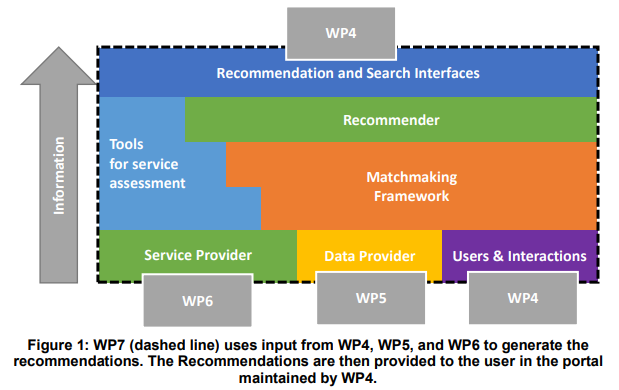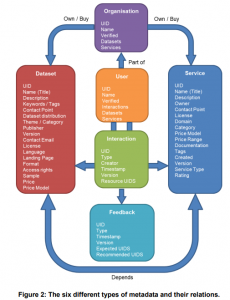The heart and soul of DMA will be the lively interactions of dataset and service providers in combination with their customers. With an increasing number of different offers available on DMA, it will be progressively difficult for customers and providers to find the partners and offers they are looking for. WP7 will offer a recommendation service as part of the DMA core components to foster the interactions between providers and customers.
Facilitate the Brokerage
The recommendation service, or recommender for short, will be designed to suggest possible collaborations of different actors on the DMA platform. Hence, the recommender will facilitate the brokerage by making users aware of the content available on DMA by its suggestions. The recommender will derive the suggestion from different sources, namely metadata describing data sets and services, past interactions of users recorded on the DMA platform, and automated assessments of service performances. From each of these sources, features describing the services and datasets on DMA will be extracted. These features are the basis to calculate the personalized recommendations presented to users of the DMA platform.
After the project initiation phase, where organisation and communication structures were established, a state-of-the-art analysis started the substantive work in WP 7. The state-of-the-art analysis collected scientific work together with software components and libraries related to WP7. The results of the states-of-the-art analysis where then brought together with the DMA requirements concerning WP 7 to derive the architecture for the software components of WP7, as seen in this high-level overview of the architecture depicted here.

A development plan was formulated along with the architecture. The results of the states-of-the-art analysis, requirements, architecture, and development plan were formally laid down in Deliverable 7.1. Additionally, the results of this work were also published on the New Business Models (NBM) conference 2017 in Graz [1].
Flow of Metadata

A vital point for WP7 is the exchange of metadata with other work packages. Hence, WP7 was an integral part of the metadata definitions for datasets (WP5 lead) and the metadata definitions for services (WP6 lead). WP7 led the discussion to define metadata describing the interactions of the users with the offers on the DMA platform. All metadata are essential inputs the recommender and search service developed by WP7. The relations between the different types of metadata are depicted in Figure 2.
With the inputs from the metadata definition, the work on extending and adapting the ScaR Framework (ScaR – Scalable Recommendation-as-a-service) have been started. The ScaR framework will be the backbone for the recommender server in WP7. Once it is adapted and extended to suite the requirements of DMA it will provide the recommendation and search functionality to the DMA portal. Hence, it will become a central component of the DMA infrastructure.
In accordance with the architecture of the DMA central infrastructure, the ScaR framework will be transformed into a self-contained Docker service. In addition to the Recommender, Work Package 7 also provides components for the evaluation of services to be provided in DMA. In the first phase of the project, the objective is to expose well known, standardize evaluation method such as trec-eval into self-contained Docker services that can be easily deployed on the DMA platform, and, using the APIs exposed by the DMA services, allow potential users of the services to get an idea of the effectiveness and efficiency of the service.
[1] Traub, M.; Gursch, H.; Lex, E. & Kern, R. (2017), Data Market Austria, in Romana Rauter; Martina Zimek; Aisma Linda Kiesnere & Rupert J. Baumgartner, ed., , Institute of Systems Sciences, Innovation and Sustainability, University of Graz, Graz, Austria, pp. 353–363.


